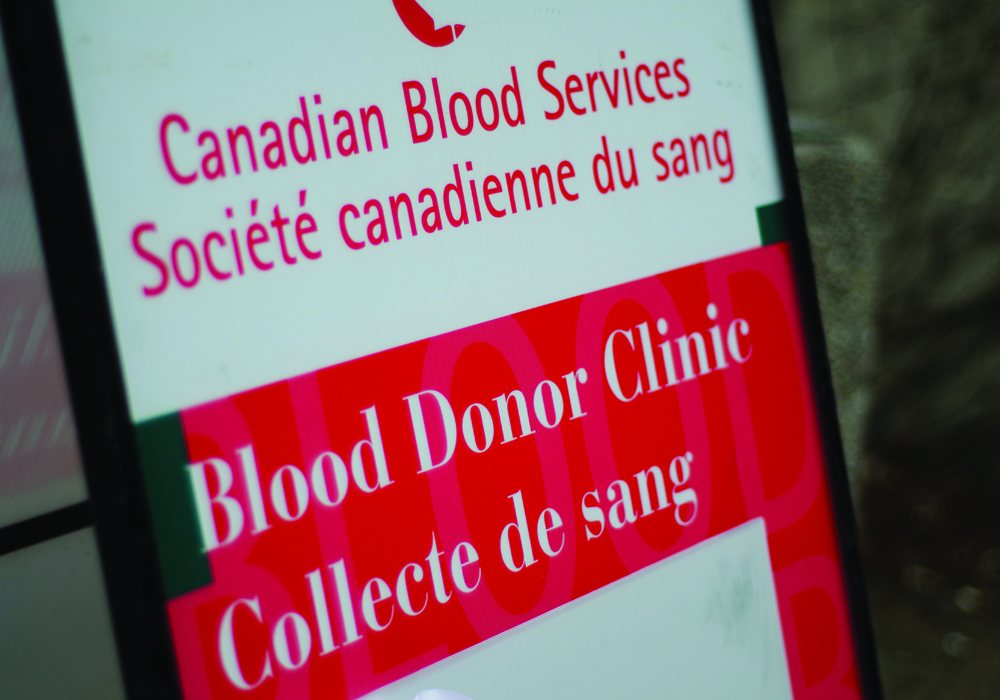Hassam Munir, Sports and Health Editor
Featured image courtesy of Michael Zusev, Photo Editor
Assignments and looming exams did not keep students from giving back to their community this past week as they lined up to donate blood at the clinic regularly set up on campus by Canadian Blood Services.
CBS sets up a week-long clinic at East Bear Pit in Central Square three times during the academic year and once in the summer. Of the 977 students who attended the clinics in the 2015-16 year, 691 were able to successfully donate blood and 220 of them were first-time donors.
This contributes to the fulfillment of the rising demand for donated blood in Canada. Every week, 1,600 new donors are required so that CBS can help patients who need blood now and in the future.
“As the current blood donor population ages, with many current donors expected to become blood users over the next few years, there is a growing need to inspire more young Canadians to get into the habit of giving blood,” explains Beth Frise of CBS.
The blood that is collected at each clinic is sent to CBS laboratories, where it is divided into red blood cells, plasma, and platelets. These are then shipped to hospitals where they can be transfused to patients in need.
“It can take many donors to save one person’s life,” says Frise. “For example, a leukemia patient needs eight units of blood weekly, therefore, eight donors are needed. Someone needing cardiovascular surgery needs five units, (which amounts to) five donors, and a car accident victim can need up to 50 units.”
Fifty units is about the amount that is collected over the course of one clinic at York. According to Frise, the “central location (of the campus) and its generous donors make it one of the most successful university clinics around.”
The members of the York community who donate blood are pleased to do so. “I think that if you have the opportunity to help someone in need, you should,” says Senada Erden, a second-year student who donates regularly. “Especially if you have too much of something. They informed us that we all have 0.5 millilitres reserve of blood, so why not donate it? It’ll regenerate itself anyway.”
Chirayu Teddy, a first-year student, donated blood for the first time at the clinic this past week.
“I was a bit hesitant due to concerns regarding hygiene, but the staff and nurses present were able to quickly show me that [my concerns] were unwarranted,” he says.
“Prior to donating blood at the on-campus clinic, I had never donated blood for the exact reason that it was unnecessarily inconvenient, so this allowed me to do something I hadn’t done [before].”
Erden also feels that the clinic on campus makes it very convenient to donate.
“Without the set-up I would have never known where to go and I’d probably never have the opportunity to donate, or at least not now,” she says.
“It’s definitely very helpful and allows us to constantly give instead of just once a year.”
“Giving blood is a great way for busy students to give back to their community without having to invest a lot of time or money,” says Frise, explaining why CBS comes to campus and does not simply wait for students to find them elsewhere.
“One donation can make a lifesaving difference and every usable part of [their] donation goes to a patient in need.”
As of the 2015-16 year, CBS established a permanent presence on campus, a club called Canadian Blood Services at York. In addition to advertising the clinics on campus and reaching out to faculties and other clubs, CBSAY has also been active in recruiting donors for CBS’ new pilot project, OneMatch.
“OneMatch is a program dedicated to recruiting healthy, committed volunteer donors for patients in need of a stem cell transplant,” explains Frise.
“Hundreds of Canadians require a donor for a stem cell transplant every year, and more than 75 per cent of them will rely on someone they don’t know to help save their life. Right now hundreds of Canadian patients are waiting for a stem cell transplant to treat potentially life-threatening illnesses such as leukemia.”
CBSAY recruited nearly 600 potential donors for the OneMatch program on campus this year, surpassing their initial goal of 500 recruits.
A CBS clinic will be set up on campus on July 20th and also in November, January, and March of the 2016-17 year. The students who have already taken part strongly recommend that others try it as well, not only because they will be able to help others, but because donating blood every once in a while may be healthy for the donor, too.
“I definitely do believe that more students should donate blood,” says Teddy. “Let them have the option to donate less though because a pint of blood is no laughing matter and students and staff alike should be aware of the health concerns.”
“In addition, it has been proven that regular blood donations can aid in deterring heart disease and cancer,” he explains. “Also, having a low viscosity allows for greater blood flow, which means less arterial blockages and significantly less damage to the blood vessels’ inner lining.”
Like us on Facebook, @excalweb





I recommend knowing your blood type and if it is a type that is in high demand consider giving more frequently.